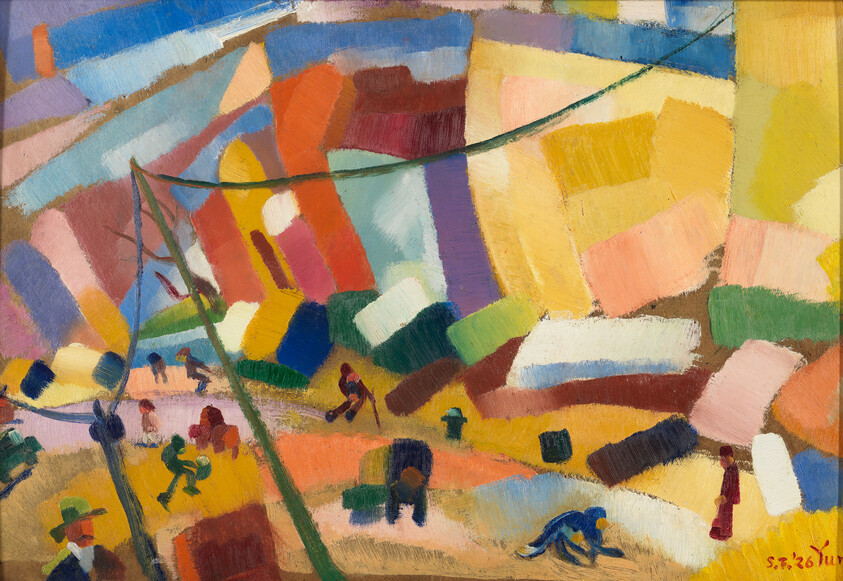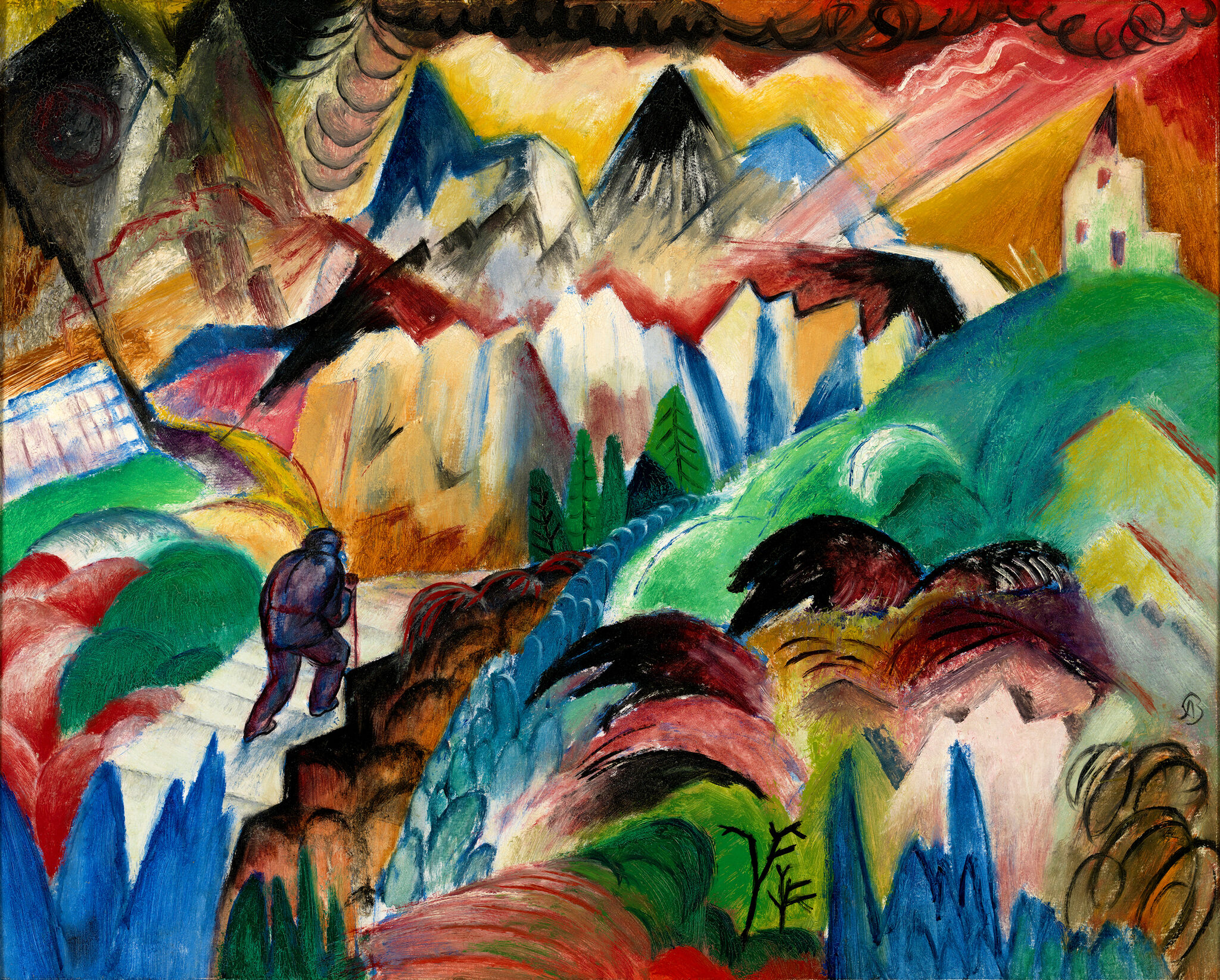Visual description
Yun Gee’s Street Scene (1926) is an oil painting on board. It measures 11 1/8 inches in height and 16 1/16 inches in width. It measures 28.3 centimeters in height and 40.8 centimeters in width.
The artist places his viewer in the position of looking down on a street scene. We are placed high above the action. A thin green pole juts up from the bottom left of the canvas and tilts to our left. A loop of wire attached to the pole curves down to our left, attaches to a lower pole, and then disappears off the canvas near the bottom left corner. On the other side of the pole—the wire arches up to our right and disappears behind a yellow rectangular shape on the canvas’s upper right corner. Below the wires we see people and things on a street. They are small implying that we are viewing them from a distance. This is not a realistic painting; the artist employs shapes and painterly marks straddling abstraction and representation. A small figure in a brown suit is to our right in the lower area of the canvas. He is created using dabs of paint for his suit, his dark hat and the beige flesh of his face. Near him—to our left in the foreground—is a figure in blue. She appears to be bending down. She might be female as she wears a scarf over her head. Behind her to our left we gaze into an open cart and behind the cart in the distance is a fire hydrant.
Moving to our left we see scattered figures moving along in different directions. They are small, lacking detail and made with marks of paint of different colors that are darker than the yellows, and peach shades that dominate the colors of the street. On the bottom left of the painting—in the foreground—emerges a fragment of a man. He is facing us. He is slightly bigger than the other figures as he is closer to us. We can see the dark shoulders of his outerwear, his white collar, a green brimmed hat, his drooping brown moustache. There is orange color on the left side of his face—dark brown on the right. Maybe he is walking into the sun. Behind this figure in the distance to the left—is half of a green car—its other half is cropped by the left edge of the canvas. From the top of the painting down to the street and dominating most of the composition are the buildings that frame the far side of the street. The artist conveys these structures with broad swatches of colors that convey vertical buildings scrunched up next to each other. The buildings loom and tilt towards us. Gee uses yellows, purples, mint greens and pastel blues for the structures. He breaks his buildings into shapes but we understand them as architecture—buildings with front stoops pushed up close to each other forming one side of a busy street. In the upper left corner and moving over their angled roofs—at the top of the painting—are swatches of light blues interrupted by slashes of green representing the sky and maybe some hills in the distance.
Not on view
Date
1926
Classification
Paintings
Medium
Oil on board
Dimensions
Overall: 11 1/8 × 16 1/16 in. (28.3 × 40.8 cm)
Accession number
77.1.18
Credit line
Lawrence H. Bloedel Bequest
Rights and reproductions
© artist or artist's estate
Audio
-
0:00
Verbal Description: Yun Gee, Street Scene
0:00
Yun Gee’s Street Scene (1926) is an oil painting on board. It measures 11 1/8 inches in height and 16 1/16 inches in width. It measures 28.3 centimeters in height and 40.8 centimeters in width.
The artist places his viewer in the position of looking down on a street scene. We are placed high above the action. A thin green pole juts up from the bottom left of the canvas and tilts to our left. A loop of wire attached to the pole curves down to our left, attaches to a lower pole, and then disappears off the canvas near the bottom left corner. On the other side of the pole—the wire arches up to our right and disappears behind a yellow rectangular shape on the canvas’s upper right corner. Below the wires we see people and things on a street. They are small implying that we are viewing them from a distance. This is not a realistic painting; the artist employs shapes and painterly marks straddling abstraction and representation. A small figure in a brown suit is to our right in the lower area of the canvas. He is created using dabs of paint for his suit, his dark hat and the beige flesh of his face. Near him—to our left in the foreground—is a figure in blue. She appears to be bending down. She might be female as she wears a scarf over her head. Behind her to our left we gaze into an open cart and behind the cart in the distance is a fire hydrant.
Moving to our left we see scattered figures moving along in different directions. They are small, lacking detail and made with marks of paint of different colors that are darker than the yellows, and peach shades that dominate the colors of the street. On the bottom left of the painting—in the foreground—emerges a fragment of a man. He is facing us. He is slightly bigger than the other figures as he is closer to us. We can see the dark shoulders of his outerwear, his white collar, a green brimmed hat, his drooping brown moustache. There is orange color on the left side of his face—dark brown on the right. Maybe he is walking into the sun. Behind this figure in the distance to the left—is half of a green car—its other half is cropped by the left edge of the canvas. From the top of the painting down to the street and dominating most of the composition are the buildings that frame the far side of the street. The artist conveys these structures with broad swatches of colors that convey vertical buildings scrunched up next to each other. The buildings loom and tilt towards us. Gee uses yellows, purples, mint greens and pastel blues for the structures. He breaks his buildings into shapes but we understand them as architecture—buildings with front stoops pushed up close to each other forming one side of a busy street. In the upper left corner and moving over their angled roofs—at the top of the painting—are swatches of light blues interrupted by slashes of green representing the sky and maybe some hills in the distance.
Verbal Description: Yun Gee, Street Scene
In At the Dawn of a New Age: Early Twentieth-Century American Modernism
Exhibitions
Installation photography
-
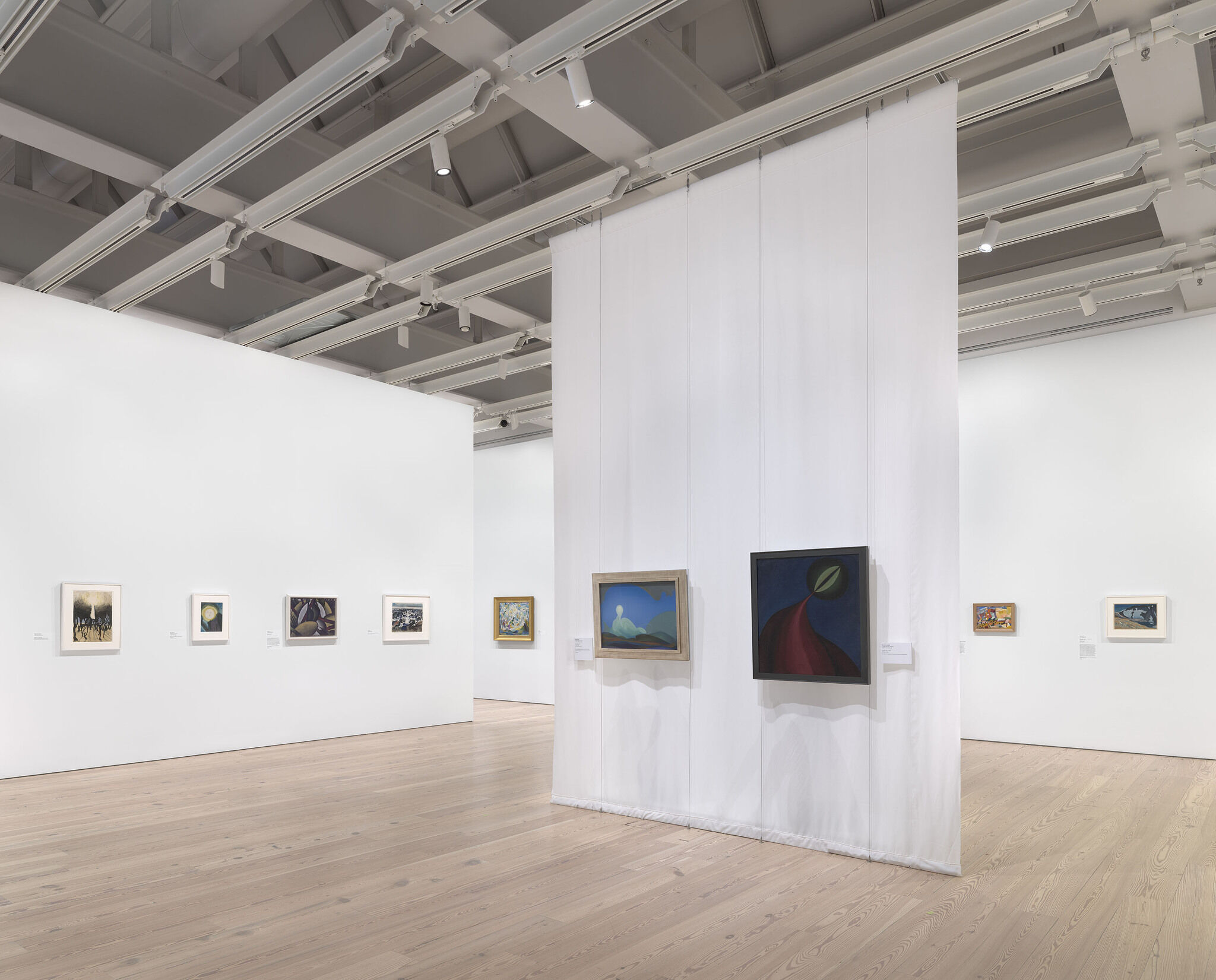

Installation view of At the Dawn of a New Age: Early Twentieth-Century American Modernism (Whitney Museum of American Art, New York, May 4, 2022-January 2023). From left to right: Charles Burchfield, Sunlight in Forest, 1916; Oscar Bluemner, #8. June – Moon, 1927; Arthur Dove, Plant Forms, 1912; John Marin, White Horses – Sea Movement off Deer Isle, 1926; Joseph Stella, Der Rosenkavalier, 1913-14; Agnes Pelton, Sea Change, 1931; Henrietta Stone, Trail of Life, 1923; Yun Gee, Street Scene, 1926; Chiura Obata, Silence, Last Twilight on an Unknown Lake, Johnson Peak, 1930. Photograph by Ron Amstutz
From the exhibition At the Dawn of a New Age: Early Twentieth-Century American Modernism
-
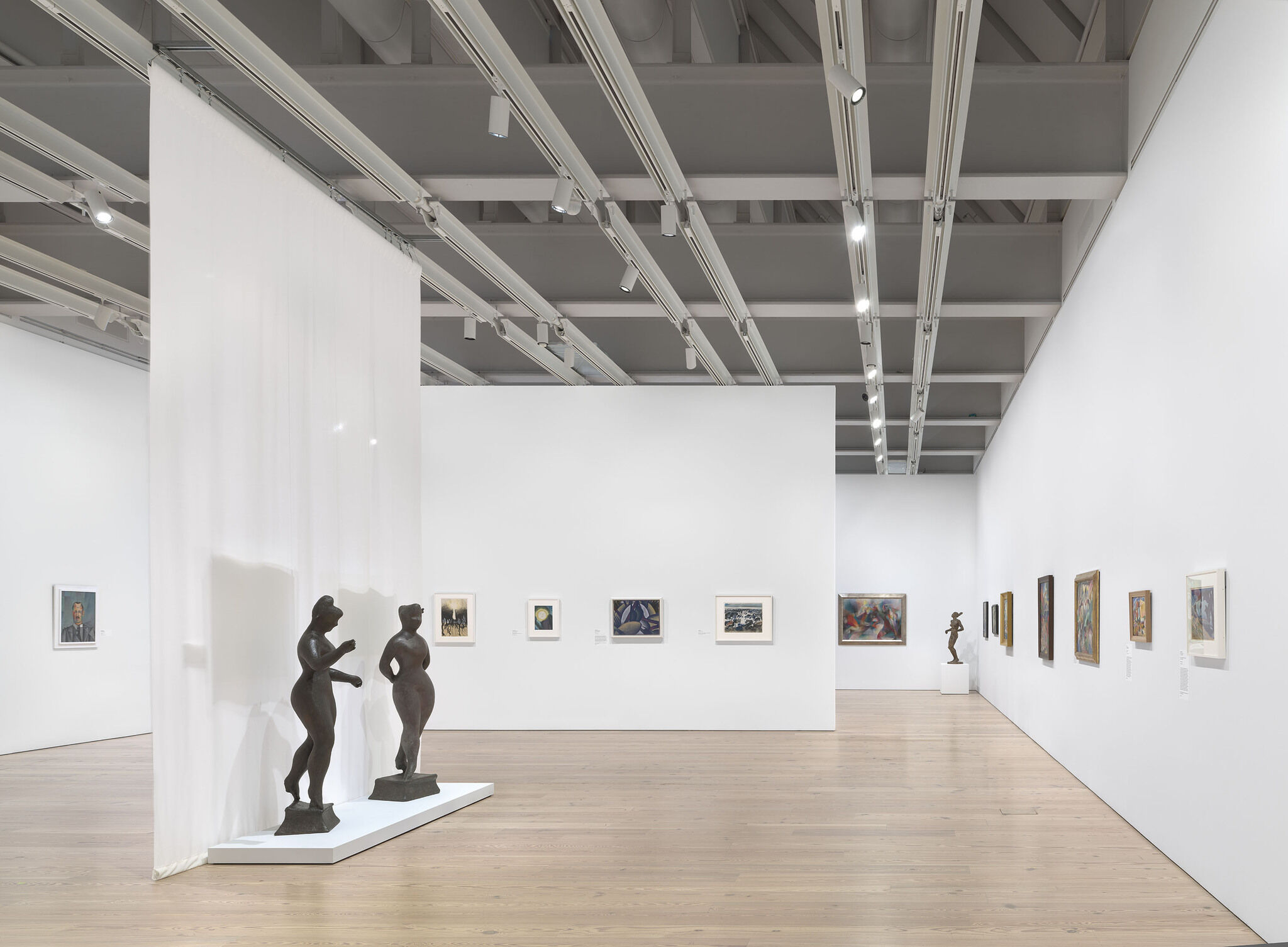

Installation view of At the Dawn of a New Age: Early Twentieth-Century American Modernism (Whitney Museum of American Art, New York, May 4, 2022–January 2023). From left to right: Charles G. Shaw, Self Portrait, c. 1930; Elie Nadelman, Standing Female Figure, c. 1925-26; Elie Nadelman, Standing Female Figure, c. 1925-26; Charles Burchfield, Sunlight in Forest, 1916; Oscar Bluemner, #8. June - Moon, 1927; Arthur Dove, Plant Forms, c. 1912; John Marin, White Horses - Sea Movement off Deer Isle, Maine, 1926; Stanton Macdonald-Wright, Oriental - Synchromy in Blue-Green, 1918; Richmond Barthé, African Dancer, 1933; Jay Van Everen, Abstract Landscape, c. 1924; Arthur B. Davies, Day of Good Fortune, c. 1914; Joseph Stella, Der Rosenkavalier, 1913-14; Carl Newman, Untitled (Bathers), c. 1917; Albert Bloch, Mountain, 1916; Yun Gee, Street Scene, 1926; Chiura Obata, Silence, Last Twilight on an Unknown Lake, Johnson Peak, 1930. Photograph by Ron Amstutz
From the exhibition At the Dawn of a New Age: Early Twentieth-Century American Modernism
-
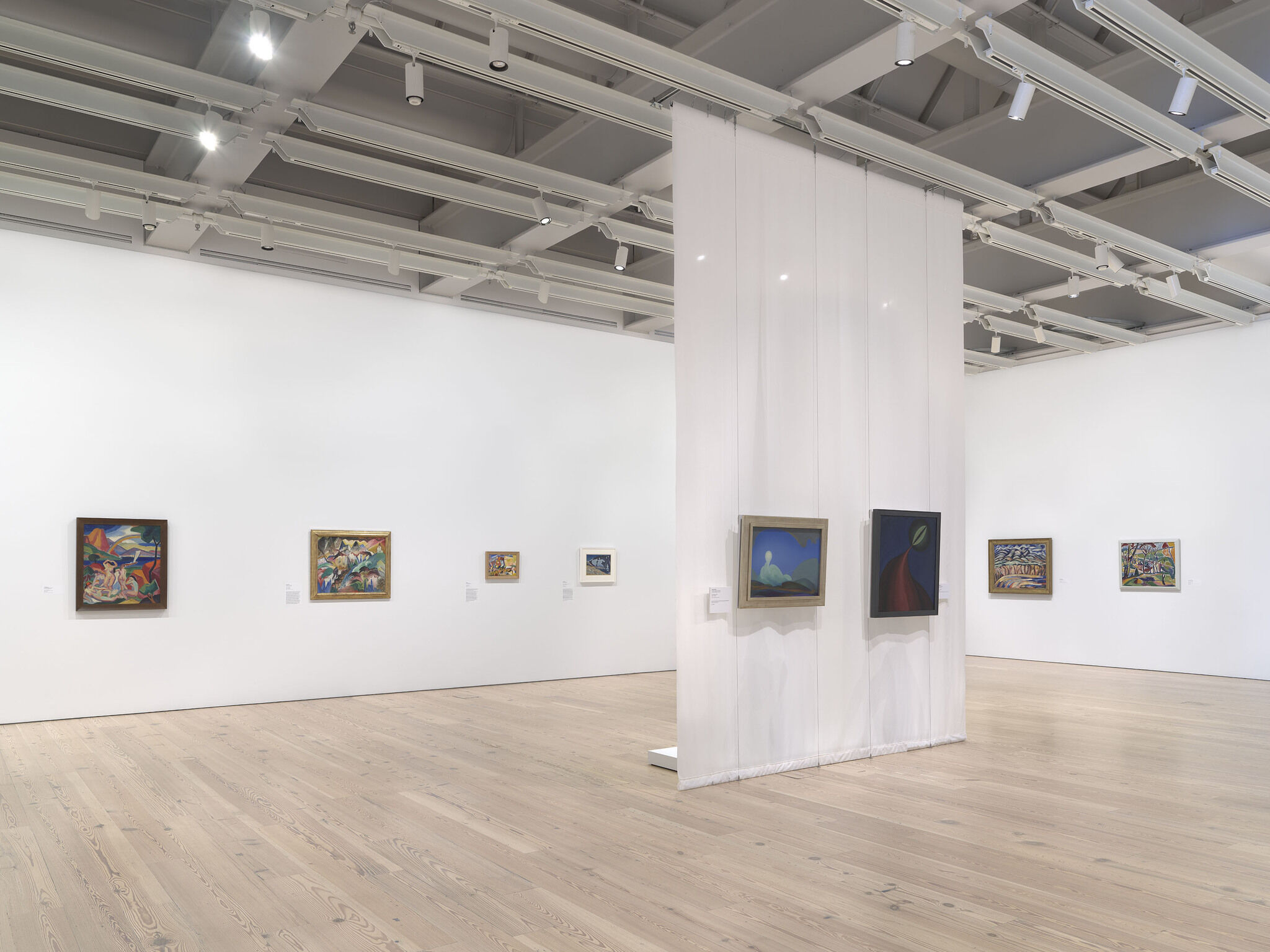

Installation view of At the Dawn of a New Age: Early Twentieth-Century American Modernism (Whitney Museum of American Art, New York, May 4, 2022-January 2023). From left to right: Carl Newman, Untitled (Bathers), c. 1917; Albert Bloch, Mountain, 1916; Yun Gee, Street Scene, 1926; Chiura Obata, Silence, Last Twilight on an Unknown Lake, Johnson Peak, 1930; Agnes Pelton, Sea Change, 1931; Henrietta Shore, Trail of Life, c. 1923; Marsden Hartley, Landscape, New Mexico, 1919-20; Henry Lyman Sayen, Valley Falls II, c. 1915. Photograph by Ron Amstutz
From the exhibition At the Dawn of a New Age: Early Twentieth-Century American Modernism

